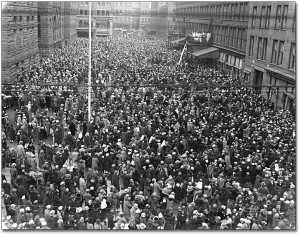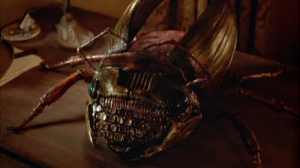News

The University of Westminster’s Department of English, Linguistics and Cultural Studies, in association with the Masters Program in Museum Studies, Johns Hopkins University, invite you to:
‘ONLINE’: What can Museums and Galleries learn from online education in Universities, and vice versa?
A Round Table discussion with keynote speaker Phyllis Hecht (Johns Hopkins University)
Wednesday 20 July 2011, 6.30-8 p.m.
The Board Room, University of Westminster, 309 Regent Street, London W1B 2UW
Entrance free. RSVP Sharon Sinclair, email sinclas@westminster.ac.uk
Phyllis Hecht is Director of the Master of Arts in Museum Studies program at Johns Hopkins University, USA. She is the Chair of the Committee on Museum Professional Training (COMPT) of the American Association of Museums (AAM). Most recently she co-edited and contributed to The Digital Museum: A Think Guide (2007), an anthology on museums and technology. Phyllis will discuss how the MA program at JHU is using social networking, including incorporating Facebook and Twitter into its learning strategy.
This event is part of the JHU Museum Studies London Onsite Summer Seminar held at the University of Westminster. The Institute for Modern and Contemporary Culture launches its new MA programme in Museums, Galleries and Contemporary Culture in September 2011.

An early heads up on the line up of speakers and list of dates for next year’s first semester series of English Literature and Culture seminars. All will take place from 1.15-2.30pm on Wednesday lunchtimes in the University’s Regent Street building (room 359).
12th October 2011
Helen Glew (History Project, University of Westminster)
“Women at the Regent Street Polytechnic, 1882 – 1945”
26th October 2011
Anna Katharina Schaffner (University of Kent)
“Havelock Ellis and the Literary Imagination: On Sexology and Fiction”
9th November 2011
Caroline Edwards (Surrey University)
“Fictions of the Not Yet”
23rd November 2011
Samuel Thomas (Durham University)
“The Gaucho Sells Out: Thomas Pynchon, Nation Building & Argentina”
Further details at: http://seminarserieswmin.wordpress.com/

‘What’s New? The Changing Face of Indian Cinema: Contemporary and Historical Contexts’
Friday 8th and Saturday 9th July 2011
Marylebone Campus, 35 Marylebone Road, London NW1 5LS
Invited speakers include: Filmmakers, Anurag Kashyap and Rituparno Ghosh, Rachel Dwyer (SOAS, London), Shohini Ghosh, (Jamia Millia Islamia University, Delhi), Lalitha Gopalan, (University of Texas at Austin).
Is mainstream Indian cinema moving into a ‘post-Bollywood’ era? In recent years a growing number of popular (and not so popular) films made for commercial release have been challenging the conventions of the mainstream multi-genre, song and dance extravaganzas. These films are being made – both within and outside the prevailing studio system – in Mumbai, Chennai, Kolkata and elsewhere. From ‘Dev D’ to ‘Just Another Love Story, Udaan’ or ‘Peepli Live,’ cinematic language is being explored, songs are disappearing or being used in different ways, and strong alternative storylines are presenting a new face of modern Indian society. These films’ hybrid sensibilities are increasingly appealing to the global aspirations of India’s urban ‘multiplex’ generation.
The London Indian Film Festival was set up in July 2010 to showcase this trend, bringing cutting edge Indian films and filmmakers to London audiences. Alongside this summer’s festival, the India Media Centre at the University of Westminster, in association with the London Indian Film Festival, is hosting a conference that will bring together filmmakers, industry professionals and academics to explore this new phenomenon within both a contemporary and an historical context.
Full conference: Standard rate £150. One day rate £100
Full conference: Student rate £65. One day rate £45.
There is an early bird discount if you pay by Thursday 30 June:
Full conference: Standard rate £125. Student rate £50
This covers all conference documentation, refreshments, lunches, a reception, reduced cinema ticket prices to LIFF events, free entry to the final night party, and administration costs.
To register please download the registration form from: http://www.westminster.ac.uk/whats-new_080711
General enquiries: please contact Helen Cohen at: H.cohen02@westminster.ac.uk
Academic enquires: please contact Daisy Hasan at: D.Hasan@westminster.ac.uk
Conference team: Rosie Thomas, Daisy Hasan, Radha Dayal, Helen Cohen.
Monday July 4th, Contemporary China Centre event on Mao, then and now
Tagged as politics, visual culture

Our friends in University of Westminster’s Contemporary China Centre present:
Through Time and Space with Chairman Mao:? The Afterlife and Global Impact of the Great Helmsman
A panel discussion with Pankaj Mishra and Jeffrey Wasserstrom, chaired by Harriet Evans
Monday, July 4, 2011, 5.00 p.m. – 6.30 p.m.
The Boardroom, University of Westminster, 309 Regent Street, London W1B
How is Mao thought about in contemporary China and in other parts of Asia? In what ways have debates about his legacy and posthumous uses of his image paralleled or diverged from those of other larger-than-life figures associated with independence movements from Nehru to Nasser and from Ho to Che? What should we make of the “red song” movement sweeping through the PRC, which can be treated as fueled by nostalgic yearning or attributed to political manoeuvring?
Pankaj Mishra is the author of The Romantics: A Novel, which won the LA Times’ Art Seidenbaum Award for First Fiction, An End to Suffering: The Buddha in the World, and Temptations of the West: How to be Modern in India, Pakistan, Tibet and Beyond. His new book The Rise of Asia and the Remaking of the Modern World will be published next year.
Jeffrey Wasserstrom is Professor of History and Chair of the Department at UC Irvine, where he also serves as the Editor of the Journal of Asian Studies. His books include Student Protests in Twentieth-Century China (1991), China’s Brave New World (2007), Global Shanghai, 1850-2010 (2009), and China in the 21st Century: What Everyone Needs to Know (2011). He is a co-founder of the “China Beat” blog/electronic magazine.
Harriet Evans is Professor of Chinese Cultural Studies, and Director of the Contemporary China Centre, University of Westminster, and is curator of the exhibition ‘Poster Power: Images from Mao’s China, Then and Now.’
Contemporary China Centre
www.westminster.ac.uk/schools/humanities/research/asian-studies
For enquiries about the Contemporary China Centre, please contact
Professor Harriet Evans: evansh@westminster.ac.uk

The Nomad Artist in a Transnational Era: Korean Contemporary Art on British Soil
Friday 1st July 2011,14:30-19:00 pm
Multi-purpose Hall, Korean Cultural Centre UK in London, Grand Buildings, 1-3 Strand, London, WC2N 5BW (Main entrance on Northumberland Avenue)
The Institute’s Visiting Research Fellow Dr Young-Paik Chun (Hong-Ik University, Seoul) has programmed this exciting forthcoming event.
14:30 – 15:00
Digital Film Screening
Interview with Eemyun Kang
4482 Korean Contemporary Artists Group Exhibition
15:00 – 16:15
Session 1. Theoretical approaches
Chair: Marquard Smith (Director, IMCC, University of Westminster)
Speaker: Young-Paik Chun (Art History and Theory, Hong-Ik University, Seoul)
Commentator: Edward Allington (Head of Graduate Sculpture, Slade School of Fine Art)
16:15 – 16:30 coffee break
16:30 – 17:40
Session 2. Panel Discussion in Art Practice I – Curatorial Practice
Chair: Jade Keun-Hye Lim (Independent Curator / APG in Museum Studies, Leicester University)
David A Bailey (Director, International Curators Forum)
Ji-Yoon Lee (Director, Suum Contemporary Art Project & Academy)
Sook-Kyung Lee (Curator, Tate Liverpool)
17:50 – 19:00
Session 3. Panel Discussion in Art Practice II – Making Art Works
Chair: Stephanie Seung-Min Kim (Director, Iskai Contemporary Art)
Mee-Kyung Shin (artist)
Chan-hyo Bae (artist)
Jin-Kyun Ahn (artist)
New Ways of Working with Image workshop, September 2011
Tagged as art, image, Theory, visual culture

‘New Ways of Working with Image’ Seminar and Workshop
Wednesday 14 September 2011
University of Westminster, 309 Regent Street, London
How do we understand ‘image’ today, and how has our notion of the image changed over time? What is the status of the image in current theory, and how does the study of image translate into visual culture? In which ways do words and verbal communication relate to or conflict with images? Do we work differently with images today, compared to the practices of previous generations? And if we do, why? Questions such as these underlie the Institute’s autumn Workshop which focuses on a practical, hands-on angle approach to working with image today.
Participants in this experiment are invited to discuss what they understand by the notion of ‘image’ and which methods they have chosen to work with it. Instead of discussing general themes and motifs without knowledge of each other’s premises, talking about what one does, and how one does it, reduces the chance of conceptual miscommunication and provides the opportunity for learning from new viewpoints. Interested academics, scholars and postgraduate students are all invited to attend.
The format of the day will be an interactive opening panel of invited speakers from art history, photographic theory, visual culture, philosophy and literary studies reflecting on their own approaches to the image in both disciplinary and transdisciplinary terms, followed by smaller group workshop sessions open to signed-up members of the audience, and concluding with general discussion. Individual workshop themes will include: (1) Image and Performance: on the nature and role of images in and as performance; (2) Imagescapes: what kinds of scenes and spaces images form and come to interact in; (3) Imaginary Image: how images condition and affect the reading experience; (4) Remediating Image: the slide and change of images between different semiotic modes.
Confirmed panel participants and workshop chairs include: David Cunningham (IMCC, Westminster), Mick Finch (Fine Art, Central Saint Martins), Andrew Fisher (Visual Culture, Goldsmiths College), Elena Gualtieri (Centre for Visual Fields, Sussex), Nigel Mapp (English Literature, Westminster), Lise Majgaard Mortensen (Aarhus University/IMCC), Luke Skrebowski (History of Art, Cambridge), Marquard Smith (IMCC, Westminster), Jarkko Toikanen (Tampere University/IMCC)
This workshop is convened by our Visiting Research Fellows in the Institute, Lise Majgaard Mortensen and Jarkko Toikkanen. For further information or to reserve a place (numbers are strictly limited!), please email Jarkko at: Jarkko.Toikkanen@uta.fi
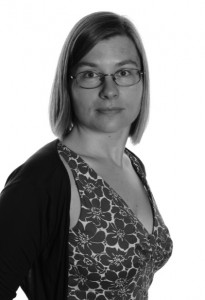
The Institute is pleased to welcome Dr Nina Lager Vestberg from the Norwegian University of Science and Technology, Trondheim, who will be a Visiting Research Fellow at IMCC from 13th-30th June.
Nina is an Associate Professor of Visual Culture at NTNU, and a Founding Member of the Visual Culture in Europe Network. She was educated in the UK, where she studied photography and multimedia at the University of Westminster (BA Hons), and history of art at Birkbeck College, London (MA and PhD). Nina has published articles on French photography and cultural memory, the indexicality of the photographic archive, and issues of copyright. Her current project investigates the cultural implications of the transformation of the photographic archive from an analogue, physical and visual environment to a digital, virtual and largely textual one. This will be the focus of her work during her stay in London, where she will be consulting primary sources in various London-based archives and collections of photographs.
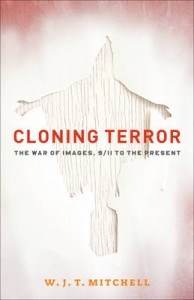
The eagerly awaited ‘Audience with W.J.T. Mitchell’ will take place in The Boardroom, 1st Floor, 309 Regent Street, University of Westminster, on Monday 13th June 2011 from 2-6. All are welcome, and attendance is free, but you must RSVP to Sharon asap here: sinclas@wmin.ac.uk
Cloning Tom: An Audience with W.J.T. Mitchell
Monday 13th June 2011, 2:00-6:00pm , 309 Regent Street, University of Westminster
To celebrate the publication of Cloning Terror: The War of Images, 9/11 to the Present (University of Chicago Press), the Institute for Modern and Contemporary Culture is thrilled to host an audience with Professor W. J.T. Mitchell. Mitchell will deliver a presentation entitled ‘The Historical Uncanny: Phantoms, Doubles, and Repetition in the War on Terror’. His presentation will be followed by a Roundtable with contributors including Maxime Boidy (Strasbourg), Abdelwahab El-Affendi (Westminster), Eyal Weizman (Goldsmiths), and Mitchell himself. The event will be chaired by Dr Marquard Smith (Westminster).
The event is FREE but booking is essential so please RSVP to Sharon Sinclair: sinclas@wmin.ac.uk
Professor W. J. T. Mitchell is Editor of Critical Inquiry and the Gaylord Donnelley Distinguished Service Professor in the Department of English Language and Literature, the Department of Art History, and the College at the University of Chicago. He is the author of seminal books including What Do Pictures Want? and Iconology: Image, Text, Ideology, and editor of collections such as Against Theory, Landscape and Power, On Narrative, and Picture Theory.
Maxime Boidy is the French translator of W.J.T. Mitchell’s Cloning Terror (with S. Roth) and has also translated books by Susan Buck-Morss and Mike Davis, as well as Mitchell’s Iconography. He is a doctorial candidate in the Laboratoire Cultures et Sociétés en Europe at Université de Strasbourg.
Dr Abdelwahab El-Affendi is Reader in Politics at the Centre for the Study of Democracy, University of Westminster and co-ordinator of the Centre’s Democracy and Islam Programme. He is also currently an ESRC/AHRC Fellow in the Global Uncertainties Programme working on a project entitled ‘Narratives of Insecurity, Democratization and the Justification of (Mass) Violence.’ Dr El-Affendi is author of books including About Muhammad: The Other Western Perspective on the Prophet of Islam, The Conquest of Muslim Hearts and Minds, For a State of Peace: Conflict and the Future of Democracy in Sudan, Rethinking Islam and Modernity, and Who Needs an Islamic State?
Dr Marquard Smith is Director of the Institute for Modern and Contemporary Culture, University of Westminster, and Founder and Editor-in-Chief of Journal of Visual Culture.
Dr Eyal Weizman is Director of the Centre of Research Architecture at Goldsmiths, University of London. His work includes buildings and stage sets in Israel/Palestine and Europe. Weizman works with a variety of NGOs and Human right groups in Israel/Palestine. He co-curated the exhibition A Civilian Occupation: The Politics of Israeli Architecture, and co-edited the publication of the same title. These projects were based on his human-rights research, and were banned by the Israeli Association of Architects. They were later shown in the exhibition Territories in New York, Berlin, Rotterdam, San Francisco, Malmoe, Tel Aviv and Ramallah. His books include Lesser Evils, Hollow Land, A Civilian Occupation, and the series Territories 1,2 and 3.
Any local flâneurs passing recently by the IMCC’s Wells Street base may have noticed the legend ‘All That Is Solid Melts Into Air’ beaming out of our side window. We can no longer keep it a secret! The IMCC is delighted to announce the installation of the Institute’s very own public display screen, provided courtesy of our friends and collaborators at Blip Creative, which will, once fully operational, be streaming a changing array of staff and student work at our site.
The state-of-the-art wall-hanging LED installation is our contribution to The International Distributed Display Initiative, which currently links together screens at Westminster, Central Saint Martins and Princeton, and is part of the Institute’s New Media Theory research project, coordinated by Peter Cornwell at Blip with Alison Craighead and David Cunningham at the IMCC. Using an interface that has been designed such that no prior programming skills are assumed, staff and students will be making work for this experimental new media laboratory that will allow them to explore in hands-on fashion what it means to translate, phenomenalize, or even perform media-theoretical issues as, and in, new media. When fully operational, the screen will then be part of a permanent internet link between installations at various international sites, allowing each collaborating institution to load and display and, using a webcam, observe content at the sites of the other organizations.
We will be staging an official launch soon, as well as announcing further details of staff and student artworks and curated exhibitions for the screen. Long live the Democratic Billboard! Watch this space …

Scarcity Exchanges: Iain Boal and Lydia Mehta
Wednesday, 1 June 2011, 6.30 pm
University of Westminster, Maylebone Campus
A reminder that, fresh from his appearance at the last of the Institute’s Matter Matters Whitechapel Salons, our friend Iain Boal is taking part in the Scarcity Exchanges organized by the Architecture Department this Wednesday, along with Lydia Mehta from Sussex. More info here.

We are happy to announce the most excellent news that Michael Nath’s debut novel La Rochelle, for which we helped to organise the official launch in 2009, is one of four books shortlisted for the prestigious the James Tait Black Memorial Prize for fiction. The shortlist was announced at Dover House, London. The winners will be announced at the Edinburgh International Book Festival in August.
The James Tait Black Award, worth £10,000 to the winner, is awarded annually by the University of Edinburgh’s School of Literatures, Languages and Cultures, and were founded in 1919 by Janet Coats, the widow of publisher James Tait Black, to commemorate her husband’s love of good books. Past winners of the awards include the likes of DH Lawrence, Graham Greene, Evelyn Waugh, Muriel Spark, Angela Carter, Cormac McCarthy, Martin Amis, AS Byatt, William Golding and Ian McEwan.
The International Association for Visual Culture is coming…
Keep a close eye out for forthcoming information on the International Association for Visual Culture.
A little background:
On 29th May 2010, as the final session of the three-day conference entitled ‘The 2010 Visual Culture Studies Conference’ held at University of Westminster, London, the subject under discussion was the proposal to establish an International Association for Visual Culture Studies. During the session, with presentations from Jeremy Gilbert (University of East London), Michael Ann Holly, and Stephen Melville (Ohio State), and convened by Marquard Smith, a motion was proposed formally by W.J.T. Mitchell (Chicago) that the Association be established. This motion was seconded by Lisa Cartwright (UC, San Diego), and the motion was passed.
At the start of April 2011, Michael Ann Holly, Starr Director of Research and Academic Programming at The Sterling and Francine Clark Art Institute, and Marquard Smith, Founding Editor-in-Chief of Journal of Visual Culture, convened a colloquium of international scholars, museum educators, and practitioners of visual culture at The Clark to discuss further the founding of such an Association – what would be its aims and mission, and how it would function in its service to its members. Following on from this colloquium, the Clark group is moving forward with the formal founding of an International Association for Visual Culture.
The Association for Visual Culture will be launched officially at a conference in New York in May 2012, convened by a group of New York State-based scholars, led by Nicholas Mirzeoff (NYU).
Information will be available soon regarding the Association’s official launch, the chance to register interest in the Association, to receive updates, membership offers, etc.
Watch this space…
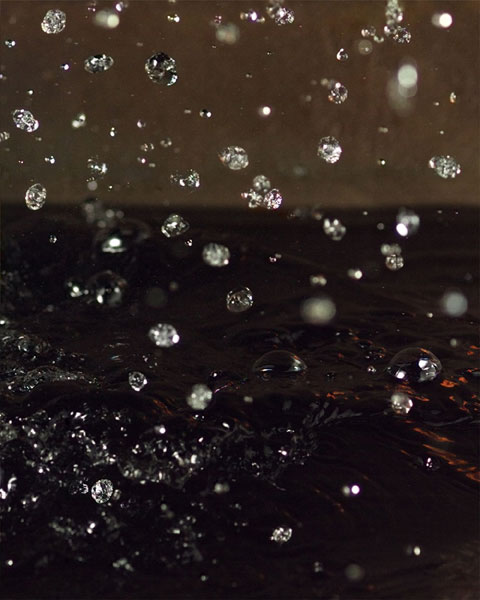
Our friends in the Group for War and Culture Studies at University of Westminster warmly invited you to:
Artist in Conversation: Ori Gersht
Group for War and Culture Studies Seminar
Thursday 16 June 2011, 6.30pm – 8.30pm
Fyvie Hall, 309 Regent Street, London W1B 2UW
Ori Gersht’s practice as a photographer is concerned with history and metaphor, journeys and geographical place, intertwined with metaphysical space. Such themes have been explored through major works that document, often obliquely, violent moments in Europe’s recent past: the scars and weals left on the sunlit, war-torn buildings in Sarajevo in his Afterwars series, the white images of ‘frustrating absence’ of his train journey to Auschwitz in White Noise, or the filmed forest loaded with the memory of war in the Ukraine in The Clearing.
At a pivotal moment in the history of photography where digital technology both threatens a crisis and promises a breakthrough, Gersht innovatively researches the possibilities and explores the materiality of his medium through still images and films that (literally) explode the genre of still life. In the films Pomegranate and Big Bang, Gersht has altered Renaissance-like still-life compositions with fast and violent interventions. Whilst a peaceful image is transformed into bloodshed and explosion, a dialogue is established between stillness and motion, peace and violence. In his most recent series of photographs, Chasing Good Fortune (2010), the cherry blossom resonates as a sign of the ephemerality of life. One of its illustrative manifestations was as propaganda in World War II as a representation of soldiers, who were thought of, in combat, to scatter like cherry blossoms, but also to die an honorable and therefore magnificent death.
At a time when many artists dealing with the political are producing work that has more in common with the medium of documentary, Gersht’s photographs, in between becoming and disappearing, have a fragile, phantom quality and dream-like texture on the verge of abstraction. More generally, his work is that of a provocative meditation.
Ori Gersht is an internationally renowned photographer and Professor of Photography at the University for the Creative Arts, Rochester.
Entrance free. R.S.V.P. Caroline Perret, tel. 020-7911-5000 ext 2307, or e-mail C.Perret@westminster.ac.uk.
A fine radio interview with our AHRC Fellow Joe Banks on ‘The Arts on Sunday’ in New Zealand.
Cloning Tom: An Audience with W.J.T. Mitchell, Monday 13th June, University of Westminster, 2-6
Tagged as photography, politics, visual culture
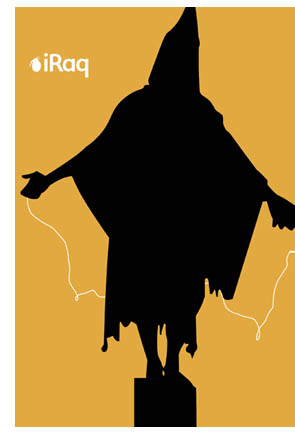
Cloning Tom: An Audience with W.J.T. Mitchell
Monday 13th June 2011, 2:00-6:00pm , 309 Regent Street, University of Westminster
To celebrate the publication of Cloning Terror: The War of Images, 9/11 to the Present (University of Chicago Press), the Institute for Modern and Contemporary Culture is thrilled to host an audience with Professor W. J.T. Mitchell. Mitchell will deliver a presentation entitled ‘The Historical Uncanny: Phantoms, Doubles, and Repetition in the War on Terror’. His presentation will be followed by a Roundtable with contributors including Maxime Boidy (Strasbourg), Abdelwahab El-Affendi (Westminster), Eyal Weizman (Goldsmiths), and Mitchell himself. The event will be chaired by Dr Marquard Smith (Westminster).
The event is FREE but booking is essential so please RSVP to Sharon Sinclair: sinclas@wmin.ac.uk
Professor W. J. T. Mitchell is Editor of Critical Inquiry and the Gaylord Donnelley Distinguished Service Professor in the Department of English Language and Literature, the Department of Art History, and the College at the University of Chicago. He is the author of seminal books including What Do Pictures Want? and Iconology: Image, Text, Ideology, and editor of collections such as Against Theory, Landscape and Power, On Narrative, and Picture Theory.
Maxime Boidy is the French translator of W.J.T. Mitchell’s Cloning Terror (with S. Roth) and has also translated books by Susan Buck-Morss and Mike Davis, as well as Mitchell’s Iconography. He is a doctorial candidate in the Laboratoire Cultures et Sociétés en Europe at Université de Strasbourg.
Dr Abdelwahab El-Affendi is Reader in Politics at the Centre for the Study of Democracy, University of Westminster and co-ordinator of the Centre’s Democracy and Islam Programme. He is also currently an ESRC/AHRC Fellow in the Global Uncertainties Programme working on a project entitled ‘Narratives of Insecurity, Democratization and the Justification of (Mass) Violence.’ Dr El-Affendi is author of books including About Muhammad: The Other Western Perspective on the Prophet of Islam, The Conquest of Muslim Hearts and Minds, For a State of Peace: Conflict and the Future of Democracy in Sudan, Rethinking Islam and Modernity, and Who Needs an Islamic State?
Dr Marquard Smith is Director of the Institute for Modern and Contemporary Culture, University of Westminster, and Founder and Editor-in-Chief of Journal of Visual Culture.
Dr Eyal Weizman is Director of the Centre of Research Architecture at Goldsmiths, University of London. His work includes buildings and stage sets in Israel/Palestine and Europe. Weizman works with a variety of NGOs and Human right groups in Israel/Palestine. He co-curated the exhibition A Civilian Occupation: The Politics of Israeli Architecture, and co-edited the publication of the same title. These projects were based on his human-rights research, and were banned by the Israeli Association of Architects. They were later shown in the exhibition Territories in New York, Berlin, Rotterdam, San Francisco, Malmoe, Tel Aviv and Ramallah. His books include Lesser Evils, Hollow Land, A Civilian Occupation, and the series Territories 1,2 and 3.
Thomson & Craighead this summer
Tagged as art, Europe, thomson

Thomson & Craighead are showing three pieces of template cinema called, ‘Somewhere in Sweden’, ‘A short film about nothing’ and ‘Five Ghosts’ as part of the online component of this years Biennale de Montreal, curated by Paule Mackrous. The exhibit is published by the Centre International d’Art Contemporain de Montreal’s electronic magazine, issue 39/2011. Other artists include: Mark Amerika, Grégory Chatonsky, Jhave and Mouchette (aka Martine Neddam). More about template cinema here.
In other news, the duo are showing ‘Tallinn Wall’ (a re-working of their installation ‘London Wall’) and ‘BEACON’ as part of Gateways: Art and Network Culture at the Kumu Art Museum, Tallinn, Estonia: the museum’s keynote exhibition for Tallinn’s year as European Cultural capital in 2011. Also, a solo presentation of ‘Flipped Clock’, curated by Richard Rinehart, will run from June 1st – August 31st 2011 at the Berkeley Art Museum, California.
Whitechapel Salon: Cultures of Capitalism I, May 12th
Tagged as capitalism, radical philosophy, Theory

Thursday 12 May 2011, 7pm
Whitechapel Gallery, 77-82 Whitechapel High Street, London E1
Price: £7.00 / £5.00 concessions (includes free glass of wine).
This season’s new Whitechapel Salon organised by the IMCC in collaboration with the Whitechapel Gallery will be on ‘Cultures of Capitalism’. In the first of four events interrogating contemporary economies of art and culture, Esther Leslie, author of Walter Benjamin: Overpowering Conformism, Adrian Rifkin, author of Street Noises, and David Cunningham, co-editor of Adorno and Literature, discuss ‘The Culture Industry Now’. Chaired by Marquard Smith.
Book your ticket at:
http://www.whitechapelgallery.org/shop/product/category_id/22/product_id/871
Our friends in the Department of Art and Media Studies at NTNU, Trondheim, Norway, are organizing The 10th International Conference of the Nordic Society for Intermedial Studies, 26th-28th October, 2011. Entitled ‘Media Acts’, confirmed speakers include Jacques Ranciere, James Elkins, Sara Danius, Frederik Tygstrup, and Aud Sissel, Hoel. The ‘Call for Papers’ is here – Media Acts October 26-28 2011 Call for papers – and the deadline for abstracts is 15th May!
The Scarcity Exchanges
Tagged as Architecture, ecology, Urban

Scarcity Exchanges
University of Westminster, 35 Marylebone Road, London NW1
All talks start at 6.30pm at 5LS
Hosted by our friends in Architecture, a series of exchanges on and around the topic of scarcity, bringing together some of the leading thinkers in the field to expound on one of the most pressing, but often avoided, issues of the day. That resources are diminishing is a commonplace, but scarcity is about much more than the destruction of our natural resource base: it is a socially and economically constructed condition that affects us all, and will increasingly do so. If the 2000s was the decade of false abundance, then the 2010s will likely be defined through scarcity. This series of exchanges will open up the discussion as to what scarcity might mean, and its social, economic, and environmental implications.
11 May: Economies of Scarcity
Dougald Hine and Andrew Simms
18 May: Cities of Scarcity
Alfredo Brillembourg and David Satterthwaite
25 May: Scarcity and Consumption
Ed Van Hinte and Steve Broome
1 June: Concepts of Scarcity
Iain Boal and Lyla Mehta
13 June: Fabricating Scarcities
Saskia Sassen
Tickets are free but please register at http://scibe.eventbrite.com/
The research project, Scarcity and Creativity in the Built Environment, is led by Jeremy Till at the University of Westminster, with partners at the Oslo School of Architecture and TU Vienna. The project is funded by HERA (Humanities in the European Research Area). For further details visit http://scibe.eu
Private View, 11th May, 309 Regent Street Gallery: ‘Poster Power: Images from Mao’s China, Then and Now’
Tagged as art, visual culture
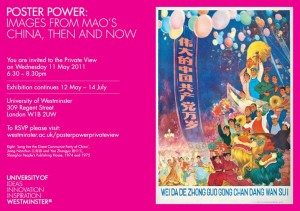
Wednesday 11th May 2011, 6:30-8:30 p.m
309 Regent Street Gallery, University of Westminster, London
You are invited to the Private View of:
‘Poster Power: Images from Mao’s China, Then and Now’
Exhibition continues 12th May – 14th July
Invitation to the Private View attached. Further information here.
Posters from Mao’s China exercise an enduring appeal to audiences across the globe, more than sixty years after the events that produced them. They are revisited in modern and contemporary Chinese art and commercial design, and curated in exhibitions in China, the US and Europe.
So why does imagery produced to support a revolutionary ideology half a century ago continue to resonate with current Chinese and Western audiences? What is the China we see between posters of the Mao years and their contemporary consumerist reinventions? How do we explain the diverse responses such imagery evokes? And what does the appeal of the posters of Mao’s China tell us about the country’s ‘red legacy’?
Poster Power explores some of these questions through setting up a visual dialogue between posters produced during the Cultural Revolution (1966-1976) and their echoes in recent years. With posters from the University of Westminster’s Chinese Poster Collection, Chinese video art, documentary film, photographs, and contemporary items such as playing cards, nightclub advertising and tourist travel publicity, the exhibition invites viewers to explore the posters’ ambiguities of appeal to their audiences. As visual reminders of both autocratic rule and exuberant youthful idealism, they evoke diverse responses, challenging the idea that Cultural Revolution poster propaganda transmitted a single, transparent meaning. These posters’ capacity to inspire ambiguous responses opens up new narratives of what remains a complex period of China’s recent past, and sheds light on its changing significance in contemporary China.
Please do come along. And bring a friend. Or two.


The Institute for Modern and Contemporary Culture
University of Westminster Department of English, Linguistics and Cultural Studies
32-38 Wells Street, London W1T 3UW. United Kingdom.


